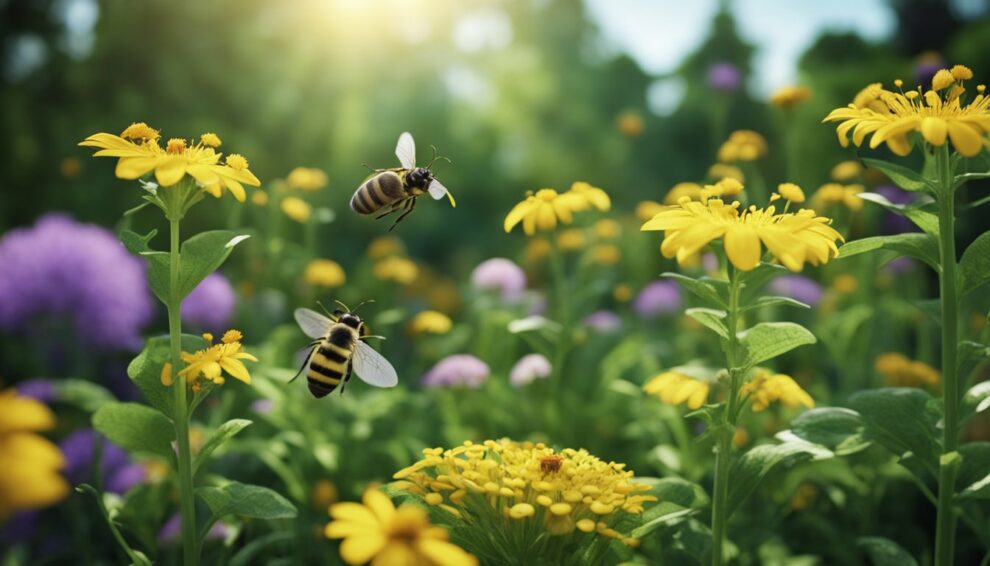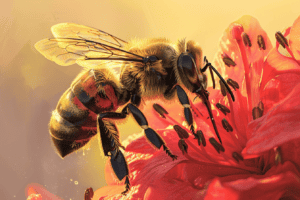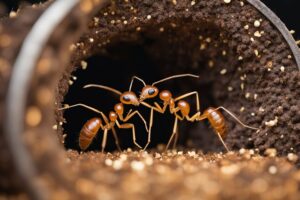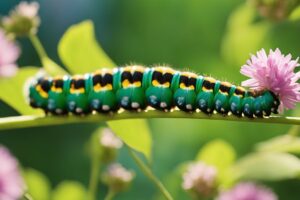Insects are everywhere! They can be found in our backyards, parks, and even in our homes.
While many of us may think of them as pests, insects play a vital role in our ecosystem.
In fact, they are essential to the survival of many plant and animal species.

The world is home to over one million known insect species, and scientists estimate that there may be millions more waiting to be discovered.
This incredible diversity of insects means that they have adapted to fill a wide variety of ecological niches.
From pollinating flowers to breaking down dead plant matter, insects help to maintain the balance of our environment.
Insects can also serve as an important food source for many animals, including birds, bats, and even some mammals.
Despite their importance, many insect populations are declining due to habitat loss, climate change, and pesticide use.
This decline has the potential to cause a ripple effect throughout the entire ecosystem.
By learning more about the role of insects in our environment, we can better understand the importance of protecting these tiny creatures and the world they inhabit.
Insects: The Tiny Engineers of Our Planet
Insects are often overlooked, but they play a crucial role in keeping our planet healthy and thriving.
These tiny creatures are like the engineers of our ecosystem, performing important tasks that help maintain the balance of nature.
Pollinators: Nature’s Essential Gardeners
Bees and butterflies are some of the most well-known pollinators. They help plants reproduce by transferring pollen from one flower to another.
This process is essential for the growth of fruits, vegetables, and other crops.
Without pollinators, we would not have the delicious foods we enjoy every day.
In fact, according to World Atlas, “about 75% of the world’s crops depend on pollinators, and about 1,000 plants grown for food, beverages, fibers, spices, and medicines need to be pollinated by animals.”
Decomposers: Recyclers of the Natural World
Insects also play a vital role in the decomposition process. They break down dead plants and animals, returning nutrients to the soil.
This allows new plants to grow and helps maintain the health of the ecosystem.
Dung beetles, for example, are excellent decomposers. They break down and bury animal waste, reducing methane emissions on dairy and beef farms.
These “garbage collectors” also reduce disease, aerate the soil, disperse seeds, and promote plant growth, as stated by World Wildlife Fund.
Insects are essential to our planet’s health and survival. They provide ecosystem services that are crucial for maintaining the balance of nature.
From pollination to decomposition, these tiny creatures play a vital role in our daily lives.
The Balancing Act: Insects in Food Webs and Agriculture

Insects are an important part of the food web, playing a crucial role in maintaining the delicate balance of nature.
They are not just pests that annoy us, but also have a significant impact on agriculture and the environment.
Predators and Prey: The Pest Control Specialists
Some insects are predators, preying on other insects that are considered pests. For example, ladybugs devour aphids, which can damage crops and other plants.
Similarly, ground beetles feed on weed seeds and insects that harm crops, helping to control pests and increase crop yields.
Ants, too, are known for their pest control abilities, as they can consume large numbers of insects and other pests.
Seeds and Soil: The Unsung Heroes of Plant Growth
Insects are not just predators, but also play a vital role in pollination and soil health.
Bees and butterflies are important pollinators, responsible for pollinating about 80% of the world’s plants [1].
Without them, many plants would not be able to produce fruits and seeds.
Insects like dung beetles also help to break down and recycle organic matter, improving soil health and nutrient cycling [2].
Insects are essential to the functioning of ecosystems and agriculture, and their importance cannot be overstated.
From pest control to pollination and soil health, insects play a crucial role in maintaining the delicate balance of nature.
So the next time you see a bug, take a moment to appreciate its contribution to the world around us!
Fun fact: Did you know that there are over one million known species of insects? That’s more than half of all known living organisms on Earth [3]!
[1] Source: World Atlas [2] Source: Sycamore Land Trust [3] Source: World Wildlife FundInsects and the Bigger Picture: Ecosystem Health and Human Benefits

Biodiversity and Resilience: Why Variety is the Spice of Life
Insects are a crucial part of our planet’s biodiversity.
They play a key role in maintaining the balance of our ecosystems by pollinating plants, breaking down organic matter, and providing food for other animals.
Insects are also important indicators of environmental health.
Changes in their populations can signal shifts in ecosystems that affect everything from soil quality to water availability.
According to a study by the National Wildlife Federation, insects provide essential ecological services worth billions of dollars each year.
These services include pollination, pest control, and nutrient cycling.
Without insects, our ecosystems would be less resilient and less able to adapt to changing conditions.
Insects and Us: How Bugs Affect Our Lives
Insects also play a vital role in human health. Many insects are important sources of food, providing essential nutrients and protein.
Insects such as bees, butterflies, and moths are also important pollinators of crops, ensuring that we have a steady supply of fruits, vegetables, and nuts.
Insects are also important for recreation. Many people enjoy watching butterflies and dragonflies, or collecting insects as a hobby.
Insects are also a source of inspiration for art and literature.
Moreover, insects have significant economic value.
According to a study by Cornell University, insects contribute over $57 billion to the US economy each year.
This includes the value of pollination services, pest control, and the production of honey and silk.
Overall, insects play a vital role in maintaining the health of our planet and our own well-being.
By protecting and conserving insect populations, we can ensure that our ecosystems remain diverse, resilient, and sustainable for generations to come.
Frequently Asked Questions

How do insects contribute to the balance of ecosystems?
Insects are critical to the balance of ecosystems. They play a crucial role in pollination, nutrient cycling, and the decomposition of organic matter.
Without insects, many plant species would not be able to reproduce, leading to a decline in biodiversity.
Insects also serve as a food source for many other animals, including birds, reptiles, and mammals, making them an essential part of the food chain.
What specific roles do insects play in supporting plant life?
Insects are essential to plant life in many ways. They pollinate flowers, allowing plants to produce fruits and seeds.
Some insects, such as bees and butterflies, are especially effective at pollination and are responsible for pollinating many of the foods we eat.
Insects also help to control pests that can damage crops, reducing the need for harmful pesticides.
Can you explain how insects impact our food supply?
Insects are critical to our food supply. They pollinate many of the fruits, vegetables, and nuts that we eat, including apples, almonds, and blueberries.
Insects also help to control pests that can damage crops, reducing the need for harmful pesticides.
Without insects, our food supply would be severely impacted, leading to food shortages and higher prices.
In what ways do insects affect the health of larger animals and humans?
Insects can affect the health of larger animals and humans in both positive and negative ways.
Some insects, such as mosquitoes and ticks, can transmit diseases to humans and other animals.
However, many insects also serve as a food source for larger animals, providing essential nutrients for their survival.
How do insects help in breaking down and recycling organic matter?
Insects play a critical role in breaking down and recycling organic matter.
They help to decompose dead plant and animal material, returning nutrients to the soil.
Insects also help to break down waste, such as fallen leaves and animal droppings, which helps to keep our ecosystems clean.
What would the consequences be for our planet if insect populations declined significantly?
If insect populations were to decline significantly, it would have a severe impact on our planet.
Insects are essential to the balance of ecosystems, and their decline could lead to a decline in biodiversity, food shortages, and higher prices.
Insects also play a crucial role in pollination, nutrient cycling, and the decomposition of organic matter.
Without insects, our ecosystems would be thrown out of balance, leading to long-term consequences for the health of our planet.









